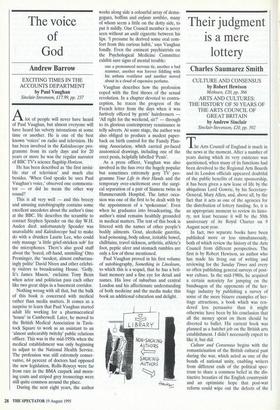The voice of God
Andrew Barrow
EXCITING TIMES IN THE ACCOUNTS DEPARTMENT by Paul Vaughan Sinclair-Stevenson, £17.99, pp. 237 Alot of people will never have heard of Paul Vaughan, but almost everyone will have heard his velvety intonations at some time or another. He is one of the best known 'voices' on radio and television. He has been involved in the Kaleidoscope pro- gramme from its early days and for 20 years or more he was the regular narrator of BBC TV's science flagship Horizon.
He has been described as 'the first invisi- ble star of television' and much else besides. 'When God speaks he uses Paul Vaughan's voice,' observed one commenta- tor — or did he mean the other way round?
This is all very well — and this breezy and amusing autobiography contains some excellent anecdotes about the author's time at the BBC. He describes the scramble to contact Stephen Spender on the day W.H. Auden died: unfortunately Spender was unavailable and Kaleidoscope had to make do with a drunken Laurie Lee, who could only manage 'a little grief-stricken sob' for the microphones. There's also good stuff about the 'bored, off-hand, unsmiling' Otto Preminger, the 'modest, almost embarrass- ingly polite' David Niven and other celebri- ty visitors to broadcasting House. 'Golly. It's James Mason,' exclaims Tony Benn when actor and politician pass each other like two great ships in a basement corridor.
Nothing wrong with all that, but the bulk of this book is concerned with medical rather than media matters. It comes as a surprise to learn that Paul Vaughan started adult life working for a pharmaceutical 'house' in Camberwell. Later, he moved to the British Medical Association in Tavis- tock Square to work as an assistant to an 'almost unbearably twitchy' public relations officer. This was in the mid-1950s when the medical establishment was only beginning to adjust to the National Health Service. The profession was still extremely conser- vative, 64 percent of doctors had opposed the new legislation, Rolls-Royces were far from rare in the BMA carpark and morn- ing coats and striped grey trouserings were still quite common around the place.
During the next eight years, the author works along side a colourful array of dema- gogues, boffins and enfants tenibles, many of whom seem a little on the dotty side, to put it mildly. One Council member is never seen without an unlit cigarette between his lips. 'I presume he derived some oral com- fort from this curious habit,' says Vaughan fondly. Even the eminent psychiatrists on the Psychological Medicine Committee exhibit sure signs of mental trouble:
one a pronounced nervous tic, another a bad stammer, another was forever fiddling with his asthma ventilator and another moved about in a cloud of expensive perfume.
Vaughan describes how the profession coped with the first throes of the sexual revolution. In a chapter devoted to contra- ception, he traces the progress of the French letter from the days when it was furtively offered by gents' hairdressers — 'All right for the weekend, sir?' — through to its glorious contemporary renaissance in telly adverts. At some stage, the author was also obliged to produce a modest paper- back on birth control for the Family Plan- ning Association, which carried p0-faced anatomical drawings, including one of the erect penis, helpfully labelled 'Penis'.
As a press officer, Vaughan was also involved in the fuss over the hugely popular but sometimes extremely gory TV pro- gramme Your Life in their Hands and the temporary over-excitement over the surgi- cal separation of a pair of Siamese twins in Hammersmith Hospital. The latter occa- sion was one of the first to be dealt with by the appointment of a 'spokesman'. Even when he graduates into broadcasting, the author's mind remains healthily grounded in medical matters. The text of this book is littered with the names of other people's bodily ailments. Gout, alcoholic gastritis, lead poisoning, body odour, irritable bowel, chilblains, travel sickness, arthritis, athlete's foot, peptic ulcer and stomach rumbles are only a few of those mentioned.
Paul Vaughan proved in his first volume of autobiography, Something in Linoleum, to which this is a sequel, that he has a bril- liant memory and a fine eye for detail and names. His love of suburban and central London and his affectionate understanding of both medicine and the media make this book an additional education and delight.


















































 Previous page
Previous page